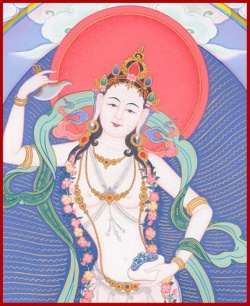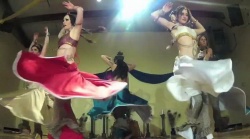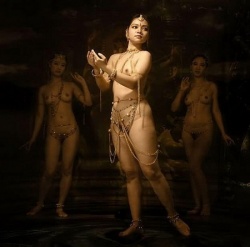Dakini Energies
A dakini (Sanskrit: "sky dancer") is a Tantric priestess of ancient India who "carried the souls of the dead to the sky". This Buddhist figure is particularly upheld in Tibetan Buddhism. The dakini is a female being of generally volatile temperament, who acts as a muse for spiritual practice. Dakinis can be likened to elves, angels, or other such supernatural beings, and are symbolically representative of testing one's awareness and adherence to Buddhist tantric sadhana.
According to legend, members of the Indian royal castes and the wealthy nobility brought their deceased to the far North to visit the Shrine of the Dakini (located at the foothills of the Himalaya). Other legends mention a Tibetan myth which says dakini first appeared in a remote area "pure of man".
Dakini are timeless, inorganic, immortal, non-human beings who have co-existed since the very beginning with the Spiritual Energy. In some New Age belief systems, they are angelic. This New Age paradigm differs from that of the Judeo-Christian by not insisting on angels being bona fide servants of God.
Moreover, an angel is the Western equivalent of a dakini. The behavior of dakini has always been revelatory and mysterious; they respond to the state of spiritual energy within individuals. Love is their usual domain - one explanation for dakini or angels supposedly living in the sky or heaven. Manifestations of dakini in human form occur because they supposedly can assume any form. Most often they appear as a human female. By convention, a male of this type is called a 'daka'.
In Tibetan Buddhism and other schools closely related to Yogacara and Vajrayana practises, a dakini is considered a supernatural being who tests a practitioner's abilities and commitments. Many stories of the Mahasiddhas in Tibet contain passages where a dakini will come to perturb the would-be Mahasiddha.
When the dakini's test has been fulfilled and passed, the practitioner is often then recognised as a Mahasiddha, and often is elevated into the Paradise of the Dakinis, a place of enlightened bliss. It should be noted that while dakinis are often depicted as beautiful and naked, they are not sexual symbols, but rather natural ones. There are instances where a dakini has come to test a practitioner's control over their sexual desires, but the dakini itself is not a being of passion. Tantric sex may involve a "helper" dakini - a human female trained in Tantra Yoga - or an "actual" dakini. Both increase the level of erotic pleasure for the sexual participants by helping them focus on a non-physical state of spiritual joy and the physical pleasure of sex at the same time.
Iconographic representations tend to show the dakini as a young, naked figure in a dancing posture, often holding a skull cup filled with menstrual blood or the elixir of life in one hand, and a curved knife in the other. She may wear a garland of human skulls, with a trident staff leaning against her shoulder. Her hair is usually wild and hanging down her back, and her face often wrathful in expression, as she dances on top of a corpse, which represents her complete mastery over ego and ignorance. Practitioners often claim to hear the clacking of her bone adornments as the dakinis indulge in their vigorous movement. Indeed these unrestrained damsels appear to revel in freedom of every kind.
There is a connection between Dakini goddess energies and all of creational feminine dieties.
Some people believe the Dakini language is linked to that of Atlantis - the trilling of the high priestesses in the language of Vril.
Dakini is the Goddess of Life's Turning Points. Distillations of archetypal emanations, the Dakinis represent those essence principles within the self which are capable of transformation to a higher octave. Dakinis are 'sky dancers,' heavenly angels devoted to the truth (dharma), woman consorts of and partners with the god-creators of India and Tibet. Dakini serves as instigator, inspirer, messenger, even trickster, pushing the tantrika (aspirant) across the barriers to enlightenment.
Dakini's wrathful aspect is depicted by the mala of skulls. Her peaceful aspect is depicted by the lotus frond. Like Hindu goddess Kali, her role is to transmute suffering. Her left hand holds high the lamp of liberation. Dakini represent the sky being a womb symbol connoting emptiness, creativity, potentiality. They are objects of desire and also carriers of the cosmic energies that continually fertilize our human sphere. Dakinis bring us pleasure and spirituality. They provoke the enervating lust that brings life into being. They are poetic and cosmic souls, put here to tempt us to spirituality.
It is said that the Dakinis have the power to instantly entrap mere mortals with their gaze. The mirror of your mind is the mysterious home of the Dakini - your right brain - your feminine side. The secret Dakinis guard the deeper mysteries of the self. Representing upsurging inspiration and non-conceptual understanding, Dakinis invite you to cut free of all limitations. They are unconventional, unexpected, spontaneous, dancing in great bliss, at one with divine truth. In the eastern tradition, a cycle of 64 Dakinis/Yoginis represents a complete cosmogram for the transformation of the self, embodying the total energy cycle of creation as depicted by the dance of Gnosis, the wisdom and energy of the divine feminine. In representing this complete cycle we have the opportunity of evoking not only the Goddess, but of manifesting the totality of the Great Goddess herself.
Yogini/Dakini temples flourished in India around the 9th through the 12th centuries. Erected in remote places, especially on hilltops, the temples were circular enclosures open to the sky. Around the inner circumference were 64 niches which housed exquisite stone carvings representing various aspects of the Goddess energy, creating a circular mandala around a central image of Shiva, symbol of Cosmic Consciousness and the one-pointedness of yogic discipline.


